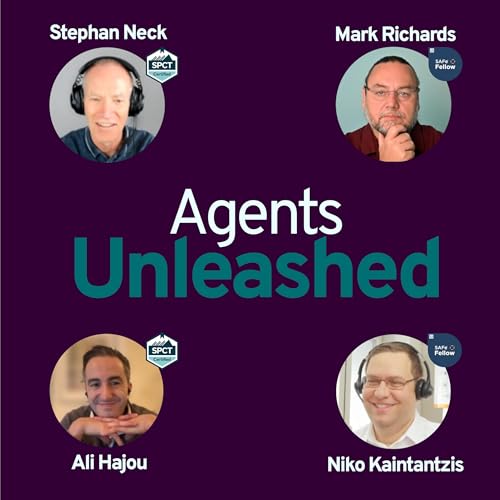
Agents Unleashed
Échec de l'ajout au panier.
Échec de l'ajout à la liste d'envies.
Échec de la suppression de la liste d’envies.
Échec du suivi du balado
Ne plus suivre le balado a échoué
-
Narrateur(s):
À propos de cet audio
Agents Unleashed is a podcast for curious change agents building the next generation of adaptive organizations — where people and AI learn, work, and evolve together.
Hosted by Mark Richards, Ali Hajou, Stephan Neck, and Nikolaos Kaintantzis, the show blends stories from the field with experiments in agility, leadership, and technology. We explore how work is changing — from agile teams to agentic ecosystems — through honest conversation, a dash of mischief, and the occasional metaphor that gets away from us.
We’re not selling frameworks or chasing hype. We’re practitioners figuring it out in real time — curious, hopeful, and sometimes hilariously wrong.
Join us as we unpack what it really means to be adaptive in a world where intelligent agents (human and otherwise) are rewriting the rules of change.
-
 57 min
57 minÉchec de l'ajout au panier.
Veuillez réessayer plus tardÉchec de l'ajout à la liste d'envies.
Veuillez réessayer plus tardÉchec de la suppression de la liste d’envies.
Veuillez réessayer plus tardÉchec du suivi du balado
Ne plus suivre le balado a échoué
-
 1 h et 2 min
1 h et 2 minÉchec de l'ajout au panier.
Veuillez réessayer plus tardÉchec de l'ajout à la liste d'envies.
Veuillez réessayer plus tardÉchec de la suppression de la liste d’envies.
Veuillez réessayer plus tardÉchec du suivi du balado
Ne plus suivre le balado a échoué
-
 58 min
58 minÉchec de l'ajout au panier.
Veuillez réessayer plus tardÉchec de l'ajout à la liste d'envies.
Veuillez réessayer plus tardÉchec de la suppression de la liste d’envies.
Veuillez réessayer plus tardÉchec du suivi du balado
Ne plus suivre le balado a échoué


